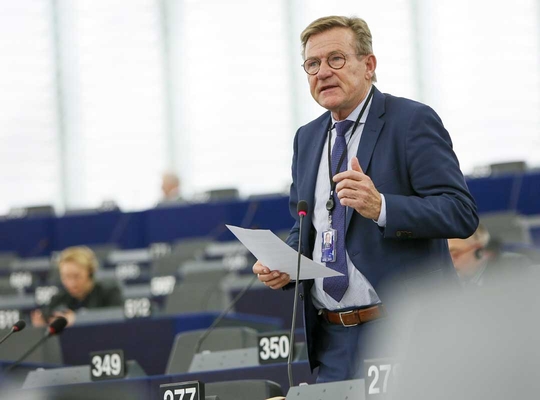You are here
The European multi-annual budget: Johan Van Overtveldt is satisfied, but regrets fragmentation

This afternoon, the negotiations on the European multi-annual budget 2021-2027 were successfully concluded. MEP Johan Van Overtveldt is satisfied with the agreement. “I am satisfied with the future-oriented choices. However, I regret that the dynamics of negotiations between the traditional parties have once again led to a great deal of fragmentation.”
MEP and Chairman of the Committee on Budgets Johan Van Overtveldt led the Parliament’s negotiating team in discussions between the European Council (and its presidency) and the European Parliament. “From the start of the negotiations, I emphasised that it is crucial - certainly with a view to recovery after the crisis - that sufficient focus is placed on future-oriented and innovative European programmes, such as Horizon and InvestEU. I am therefore satisfied that this extra effort is clearly visible in the end result. The EU really must focus on the future and on policy choices that can make a difference.”
More research, innovation and entrepreneurial spending
Chairman of the Committee on Budgets Johan Van Overtveldt notes that the new approach taken in preparing the 2020 budget will be continued. “The shift to more research, innovation and entrepreneurial spending is now also being applied to the multi-annual budget. This shift is absolutely necessary for our growth, for job creation and for Competitiveness The extent to which companies in one country can compete with similar companies in another country. A law came into force in Belgium in 1996 to monitor competitiveness. This stipulates that Belgian salaries may not evolve faster than the average of those in the three neighbouring countries. The Central Economic Council (CEC) performs an annual measurement to see if the objectives have been obtained. competitiveness . In addition, we must continue to strengthen the internal market.”
EUR 16 billion in additional resources
Compared to the proposal formulated by the European Council in July, approximately EUR 16 billion in additional resources are provided for:
- EU4Health, the health programme designed to deal with the impact of COVID-19 on healthcare, will be allocated an additional EUR 3.4 billion. This is three times the original amount.
- Horizon, the programme for innovation and research, and thus of great importance to researchers and entrepreneurs, can expect an extra EUR 4 billion.
- The budget for InvestEU, the strategic investment programme, and for Creative Europe, the programme for the creative and cultural sectors, will be increased by EUR 1.8 billion.
- The well-known Erasmus programme can also expect an additional EUR 2 billion.
- The budget for Frontex and the Border Management Fund will also be increased by EUR 1.5 billion.
- Finally, another EUR 1 billion for so-called “flexibility” has been built in for future challenges.
Johan Van Overtveldt is satisfied with these future-oriented choices. “What I do regret, however, is that the dynamics of negotiations between the traditional parties have once again led to a great deal of fragmentation across various other items. The focus must be on large, efficient, future-oriented programmes.”
Coronavirus recovery plan in operation
With the conclusion of these negotiations, the EU coronavirus recovery plan can finally be activated. “This plan is of great importance in getting through the crisis, but its success or failure depends on its implementation. The resources must get to where they are actually needed. Here too, the European Union must prove its credibility.”
“I would like to thank the various delegations for their efforts and constructive cooperation, and I call on the European Council to take responsibility for ratifying the agreement reached,” Johan Van Overtveldt concludes.

